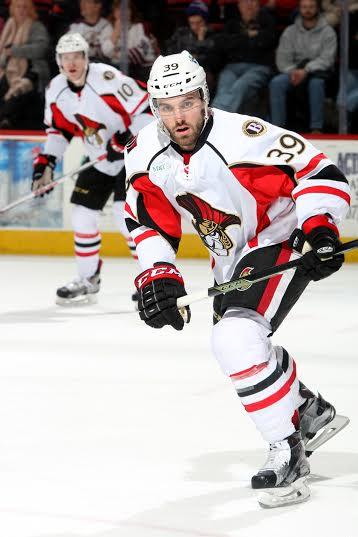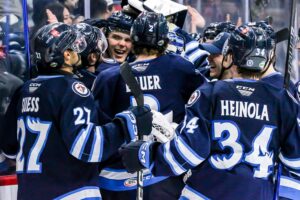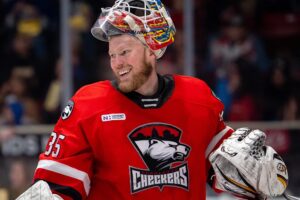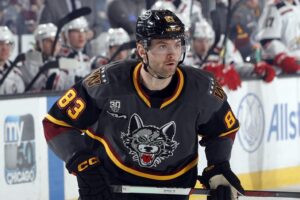By Nicole Del Villano | AHL On The Beat Archive
Professional hockey players follow similar paths to get to their goal though there may be a couple different turns along the way. That proves to be no different with four players of the Binghamton Senators rookie class: one college athlete signed to a National Hockey League contract, one draft pick, and a juniors player who signed an American Hockey League contract. While they may not have all gotten to the AHL the same way, they all have the same goal: to make hockey their career.
Matt O’Connor, Nick Paul, and Ryan Penny are only a handful of players who represent the B-Sens rookies, but they all have the same drive to make their game the best it can be.
Most players have memories of early mornings on the ice with one or both parents looking on, and that proves to be no different for the newest B-Sens.
Paul got his start in hockey young being at the rink as long as he could remember thanks to his older brother who also played growing up. Penny also had his family to thank for his start after his Dad taught him how to conduct himself and told him about all the great things of hockey.
Looking up to players like Peter Forsberg, Curtis Joseph, and following similar NHL teams like the Toronto Maple Leafs, the rookies began to move further toward their goals.
“I was in a lot of sports; lacrosse, football, and hockey were the main ones,” said Paul. “I went into hockey and started to take it seriously. I went out everyday in the summer and start working the best at it.”
As the rookies found out, after choosing to go into hockey, most players who begin to move toward the professional hockey path need to make the decision whether to go into juniors or college.
COLLEGE vs JUNIORS
Despite all the rookies getting offers on both sides, O’Connor was the only one to move toward collegiate playing.
“My family has always been education focused,” said O’Connor. “My grandparents always wanted me to go to a university and my sister is at a university, so it became a dream before there was an opportunity to play major juniors, and I stuck with it.”
O’Connor started to move toward looking to play in the states when he was in 8th grade and applied to a private high school. The goalie started playing midget hockey before moving in to the Central Canada Hockey League and the United States Hockey League. His hard work paid off after he started to get looks from colleges and eventually played for Boston University.
“I think that’s something you have to work toward,” said O’Connor. “It’s real competitive in college. I kept it quiet between me and my family and hoped that there would be some opportunity [to further my career] after college.”
While he waited for the chance to play after college, O’Connor used his time both on and off the ice to continue to grow. The 23-year-old goalie played in a total of 76 games finishing his last year with 2.18 goals against average and a .912 save percentage for BU. It was his time off the ice, though, that made the experience worth it for him.
“[College] gives you more time to develop as a goalie which is really important,” said O’Connor. “Obviously you [also] get to have the college experience- [It puts] you in those situations where you’re in lectures and giving presentations. Just being a regular student is just good for overall balance.”
For the other players, deciding between college and juniors wasn’t as easy of a choice.
“One of the hardest decisions I had to make [was between college or juniors] because at 16-years-old I was drafted to the Moncton Wildcats,” said Penny. “I went to camp and didn’t know what I was going to do but decided that [this] was the best fit for my development.”
Paul also felt a similar weight with the decision after a slow start getting into the next level. After turning to midget hockey, Paul started to get more attention from the Quebec Major Junior Hockey League and Ontario Hockey League and made the decision with his family to join Brampton Battalion.
GETTING INTO THE BIG LEAGUES
The rookies continued to take different paths before coming together in the AHL. For Paul, his time came in the fourth round of the 2013 NHL Entry Draft.He was picked 101 overall by the Dallas Stars and finally had validation for all the hard work he had to go through.
“It was a good feeling [after] just being the underdog in my life,” said Paul. “I hit my growth spurt really late but found all the work I put into this paid off. Being with my family and getting to share it with them was a really great experience.”
O’Connor went undrafted, but was a popular focus during the offseason after a successful time in Boston. Several NHL teams expressed interest in the goalie and after making lists and conferring with his family, O’Connor landed with the Senators after feeling like a perfect fit with the people, culture, and the way they saw him as a goalie.
Penny went undrafted following his time in the juniors. After posting 70 points over 66 games in his final year, he was signed to an AHL contract with the Binghamton Senators. The transition into the professionals is something that both Penny and the other rookies all noticed.
TRANSITIONING TO THE PROS
No matter how many years a player has been in the hockey world, the transition into the professionals is always one that is felt. Faster skating, bigger guys and harder hits are only a few of the things some of the Binghamton Senators rookie class has had to adjust to along the way.
“It was a whirlwind,” said Penny. “I think the biggest thing was making sure I compete and work every night and keep getting better and improving both in practices and games.”
O’Connor felt a big change as goaltender going to a faster tempo and playing three games in a weekend. Through the help of veteran teammates and his dedicated coaching staff, O’Connor managed to overcome a rough start to his rookie campaign. They also helped the netminder transition from balancing schoolwork and hockey to investing fully in his game.
For Paul, his path to the B-Sens started after being traded to the Senators organization, and he once again began to work his game in a new way.
“I came in this year trying to be as big and fast and strong as possible and trying to get ready for it.,” said Paul. “Living with Eric O’Dell helped me get routines better [off of the ice].”
A big help with any rookies transition to the pros can be found in their teammates and coaches, and in this case, the B-Sens organization is no exception as Paul explains.
“Luke [Richardson] also helped me out by bringing me in early and telling me to stay confident,” said Paul. “The biggest thing moving to the next level is staying confident. When you have people there helping and keep putting their faith in you, it makes a big difference.”
The dedicated team and coaching staff along with the hard work of the rookies has begun to pay off: O’Connor was called up to Ottawa and saw time in a game, while Paul is currently with the Senators on his first professional call up.






































